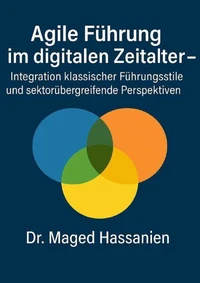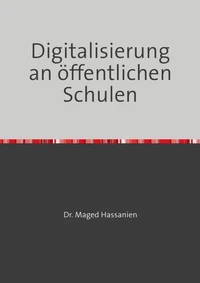New Work - Effects of Digitalisation. In the age of digitalisation, Industry 4.0 and after the coronavirus pandemic - an analysis of the Changes in the workplace
Par :Formats :
Disponible dans votre compte client Decitre ou Furet du Nord dès validation de votre commande. Le format ePub est :
- Compatible avec une lecture sur My Vivlio (smartphone, tablette, ordinateur)
- Compatible avec une lecture sur liseuses Vivlio
- Pour les liseuses autres que Vivlio, vous devez utiliser le logiciel Adobe Digital Edition. Non compatible avec la lecture sur les liseuses Kindle, Remarkable et Sony
 , qui est-ce ?
, qui est-ce ?Notre partenaire de plateforme de lecture numérique où vous retrouverez l'ensemble de vos ebooks gratuitement
Pour en savoir plus sur nos ebooks, consultez notre aide en ligne ici
- Nombre de pages122
- FormatePub
- ISBN978-3-7598-1744-0
- EAN9783759817440
- Date de parution20/05/2024
- Protection num.pas de protection
- Taille2 Mo
- Infos supplémentairesepub
- ÉditeurA PRECISER
Résumé
New Work is a term that has become increasingly important in recent decades and
stands for a comprehensive change in the way we work. This topic reflects a paradigm
shift in the world of work that is revolutionising both working conditions and attitudes
to work itself. It is not just a trend, but a movement that is reshaping the world of work
from the ground up.1
Rigid hierarchies, fixed working hours and clear role structures have traditionally
characterised the world of work.
However, these structures have dissolved in the globalised and digitalised world, giving rise to new ways of working. New Work stands for an approach in which work is no longer seen solely as a means of earning money, but rather as a means of promoting personal fulfilment and individual growth.2 The idea that work and life do not have to be separate, but can be harmonised, is a central aspect of New Work.
This is illustrated by the demand for more flexible working hours, home office options and a better work-life balance. Employees should have the freedom to organise their work in a way that meets their personal needs and life circumstances. Digitalisation and automation are also changing the way we work. Many tasks are being taken over by machines, which means that human work is focussing more on creative, strategic and interpersonal tasks.
New work also means focussing on the strengths and potential of employees instead of expecting them to perform repetitive and monotonous tasks. Terms such as self-realisation, agility, lifelong learning and corporate culture also play a decisive role in this new world of work. New Work requires a rethink at all levels of the organisation, from management to the individual employee. The changes affect not only the economy, but also the education system, society and the lifestyle of the individual.
However, these structures have dissolved in the globalised and digitalised world, giving rise to new ways of working. New Work stands for an approach in which work is no longer seen solely as a means of earning money, but rather as a means of promoting personal fulfilment and individual growth.2 The idea that work and life do not have to be separate, but can be harmonised, is a central aspect of New Work.
This is illustrated by the demand for more flexible working hours, home office options and a better work-life balance. Employees should have the freedom to organise their work in a way that meets their personal needs and life circumstances. Digitalisation and automation are also changing the way we work. Many tasks are being taken over by machines, which means that human work is focussing more on creative, strategic and interpersonal tasks.
New work also means focussing on the strengths and potential of employees instead of expecting them to perform repetitive and monotonous tasks. Terms such as self-realisation, agility, lifelong learning and corporate culture also play a decisive role in this new world of work. New Work requires a rethink at all levels of the organisation, from management to the individual employee. The changes affect not only the economy, but also the education system, society and the lifestyle of the individual.
New Work is a term that has become increasingly important in recent decades and
stands for a comprehensive change in the way we work. This topic reflects a paradigm
shift in the world of work that is revolutionising both working conditions and attitudes
to work itself. It is not just a trend, but a movement that is reshaping the world of work
from the ground up.1
Rigid hierarchies, fixed working hours and clear role structures have traditionally
characterised the world of work.
However, these structures have dissolved in the globalised and digitalised world, giving rise to new ways of working. New Work stands for an approach in which work is no longer seen solely as a means of earning money, but rather as a means of promoting personal fulfilment and individual growth.2 The idea that work and life do not have to be separate, but can be harmonised, is a central aspect of New Work.
This is illustrated by the demand for more flexible working hours, home office options and a better work-life balance. Employees should have the freedom to organise their work in a way that meets their personal needs and life circumstances. Digitalisation and automation are also changing the way we work. Many tasks are being taken over by machines, which means that human work is focussing more on creative, strategic and interpersonal tasks.
New work also means focussing on the strengths and potential of employees instead of expecting them to perform repetitive and monotonous tasks. Terms such as self-realisation, agility, lifelong learning and corporate culture also play a decisive role in this new world of work. New Work requires a rethink at all levels of the organisation, from management to the individual employee. The changes affect not only the economy, but also the education system, society and the lifestyle of the individual.
However, these structures have dissolved in the globalised and digitalised world, giving rise to new ways of working. New Work stands for an approach in which work is no longer seen solely as a means of earning money, but rather as a means of promoting personal fulfilment and individual growth.2 The idea that work and life do not have to be separate, but can be harmonised, is a central aspect of New Work.
This is illustrated by the demand for more flexible working hours, home office options and a better work-life balance. Employees should have the freedom to organise their work in a way that meets their personal needs and life circumstances. Digitalisation and automation are also changing the way we work. Many tasks are being taken over by machines, which means that human work is focussing more on creative, strategic and interpersonal tasks.
New work also means focussing on the strengths and potential of employees instead of expecting them to perform repetitive and monotonous tasks. Terms such as self-realisation, agility, lifelong learning and corporate culture also play a decisive role in this new world of work. New Work requires a rethink at all levels of the organisation, from management to the individual employee. The changes affect not only the economy, but also the education system, society and the lifestyle of the individual.





